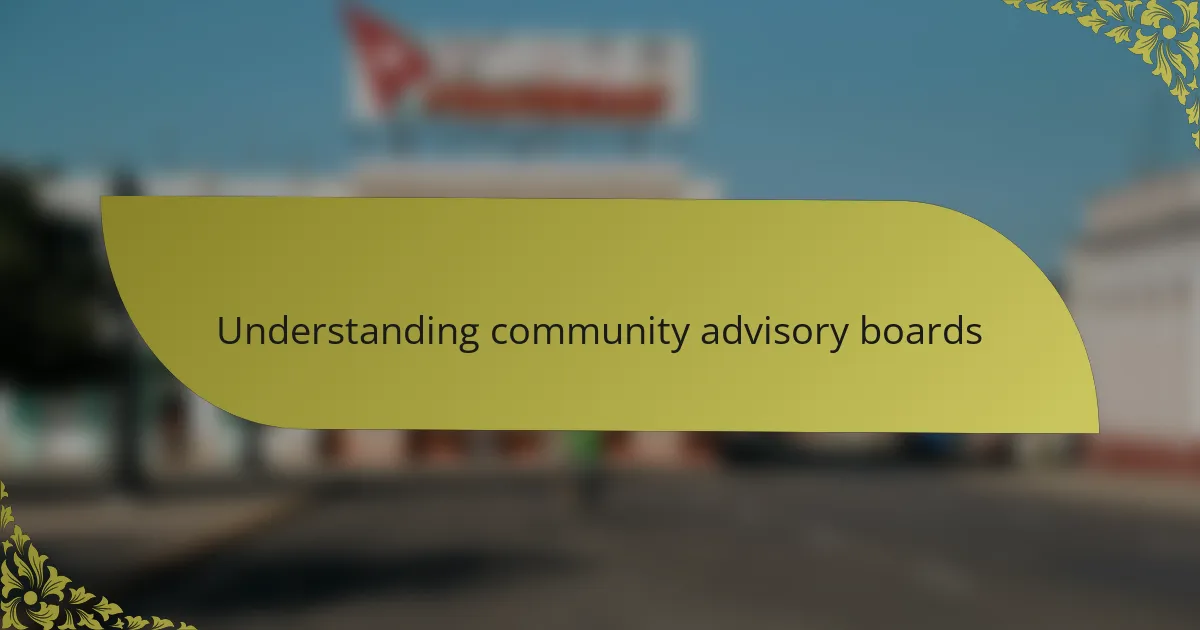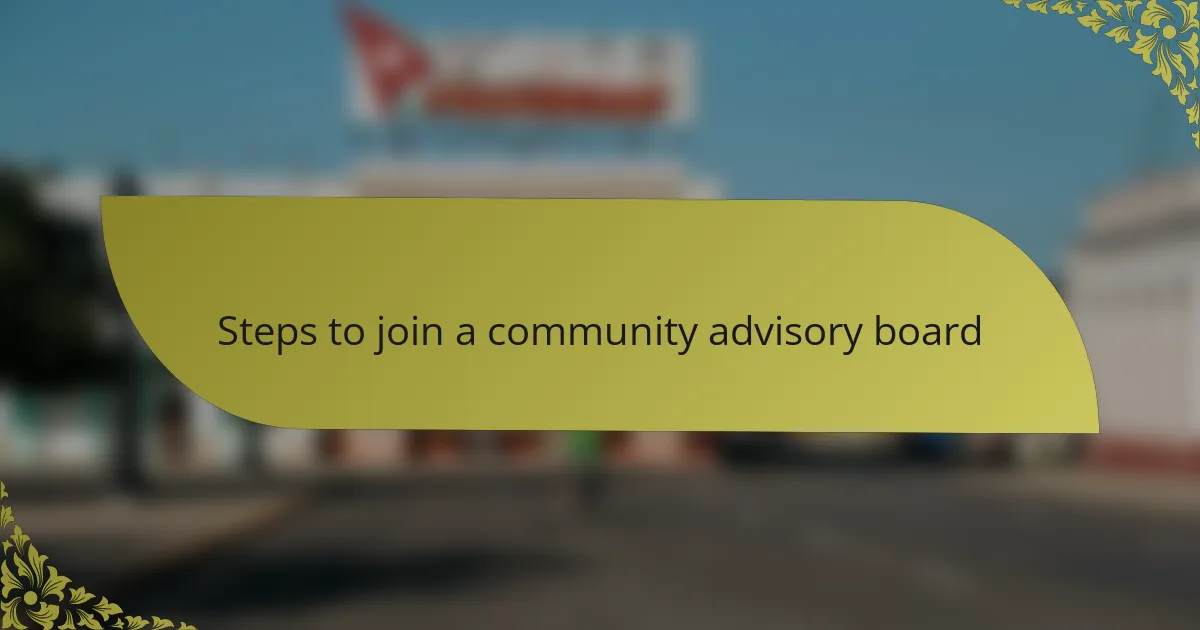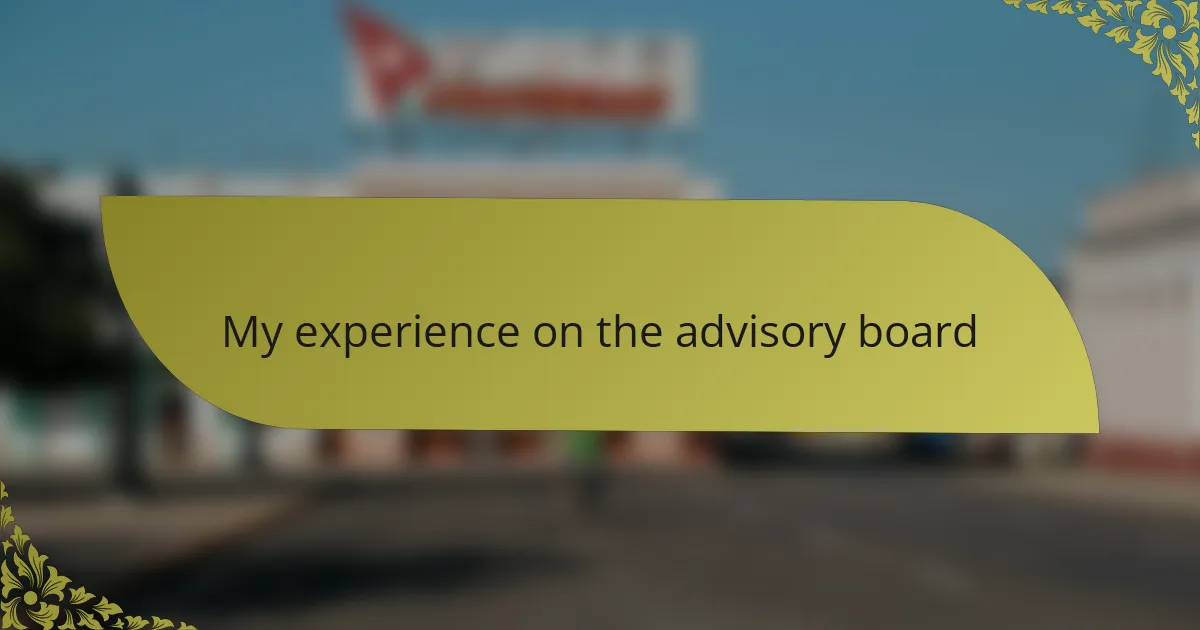Key takeaways
- Community advisory boards enhance civic engagement by allowing residents to voice concerns and influence local governance.
- Diverse perspectives within these boards lead to richer discussions and more effective solutions for community challenges.
- Joining a community advisory board involves researching local opportunities, expressing interest, and participating in orientation to align with the board’s mission.
- Active listening and resilience are essential skills learned through collaboration, allowing for personal growth and impactful community contributions.

Understanding community advisory boards
Community advisory boards play a crucial role in bridging the gap between local government and residents. I remember my first meeting vividly; it felt so empowering to have a voice in discussions that directly impacted our community. Have you ever wondered how many decisions are made without considering the input of those they affect?
These boards typically consist of diverse members representing various community interests, ensuring a range of perspectives are heard. I’ve found that this variety enriches the dialogue, leading to more comprehensive solutions. It’s fascinating to see how different experiences can shape opinions and drive collaboration.
Participating in a community advisory board helped me appreciate the complexities of local governance. It’s not just about implementing policies but also about genuinely understanding community needs. Why do you think some people hesitate to get involved in these discussions? From my experience, the more we engage, the stronger our community becomes.

Importance of participation in government
Engaging in government processes is vital because it empowers individuals to influence decisions that affect their lives. I recall a heated debate at one meeting about funding for local schools; the energy in the room was palpable. When residents share their stories, it transforms abstract policies into real-world implications, urging officials to act more responsibly.
I’ve noticed that many community members underestimate their impact. At one session, someone shared their challenges with public transportation; it resonated with others and prompted a collaborative effort that ultimately changed local transit routes. Isn’t it fascinating how a single voice can spark a movement?
Moreover, active participation fosters accountability in leadership. When officials see their constituents engaged, they are more likely to be transparent and responsive to community needs. Reflecting on my own experience, I found that when I spoke up, it inspired others to do the same, creating a dynamic interplay of ideas that can lead to meaningful change.

Role of advisory boards in Louisiana politics
Advisory boards play a crucial role in shaping public policy in Louisiana. From my experience on such a board, I found that these groups often serve as a bridge between community concerns and government decisions. They empower citizens by giving them a voice in the political process, which is essential in a state rich in diverse cultures and perspectives.
During my time on the board, I witnessed firsthand how our recommendations led to actionable change in local initiatives. Here are a few key roles advisory boards fulfill in Louisiana politics:
- Facilitating Communication: They help convey community needs directly to policymakers.
- Gathering Diverse Perspectives: Boards are often comprised of members from various backgrounds, ensuring a wide range of opinions.
- Providing Expert Insight: Many advisory members bring specialized knowledge, helping to inform policy decisions.
- Driving Community Engagement: They encourage residents to participate in government processes, enhancing civic involvement.
- Monitoring Progress: Advisory boards often track the implementation of policies to ensure they align with community goals.
Engaging with fellow members and seeing our collective efforts impact real change was truly an uplifting experience that highlighted the power of local governance.

Steps to join a community advisory board
Joining a community advisory board can seem daunting, but the steps are straightforward. First, I recommend researching which boards are available in your area and what issues they focus on. This is crucial because aligning your interests with the board’s mission can make your participation more meaningful. Have you ever felt a deep connection to a local issue? That’s where your passion can guide your choice.
Once you’ve identified a board, reach out to express your interest. I remember sending a simple email to the board coordinator, sharing my background and my desire to contribute. It’s amazing how a small act of interest can open the door to opportunities you might not have considered otherwise. Did you know that many boards actively seek out diverse voices? Your unique perspective could be just what they’re looking for.
Lastly, prepare for an interview or orientation session. I found this step to be both exciting and nerve-wracking. This is your chance to not only demonstrate your commitment but also to learn about the board’s dynamics and ongoing projects. Are you ready to make a difference? I can assure you that the experience of sharing ideas and collaborating with like-minded individuals is incredibly rewarding.

My experience on the advisory board
During my time on the advisory board, I experienced a profound sense of community connection. I recall one discussion where we tackled local environmental issues; the passion in the room was palpable. It was inspiring to see everyone’s commitment to making our community a better place. Isn’t it remarkable how shared concerns can unite us all?
I also remember moments of frustration when stakeholders disagreed. Yet, through these challenges, I learned the importance of patience and compromise. One meeting shifted my perspective completely when someone offered a solution I hadn’t considered. This taught me that diverse viewpoints can lead to creative resolutions, something I now deeply value in collaborative settings.
Engaging with fellow board members allowed me to grow, both personally and professionally. The relationships I built were not just about policy; they became a support network. Reflecting on this experience, I often wonder if others understand how enriching community involvement can be. Have you ever felt that sense of belonging while working toward a common goal? For me, it was life-changing.

Lessons learned from my participation
Participating in the advisory board taught me the true meaning of collaboration. I vividly remember a meeting where differing opinions sparked an intense but fruitful debate. It was in that heated moment I realized that sometimes, conflict can be a catalyst for growth. Have you noticed how shared challenges can actually bring people closer together?
One significant lesson was the value of active listening. There were instances when a quieter member proposed an idea that I initially dismissed. However, after giving it some thought, I found it had merit and could enhance our discussions. This experience reinforced my belief that every voice matters, and it’s essential to create an environment where everyone feels comfortable sharing their thoughts.
Finally, my time on the board highlighted the importance of resilience. Not all discussions led to immediate change, and that was tough to accept at times. I learned that progress can be slow, yet every small step counts. Reflecting on my journey, I often remind myself that persistence and dedication can lead to meaningful transformation in our community. Have you experienced something similar in your efforts to effect change? The road may be long, but the rewards are worth it.